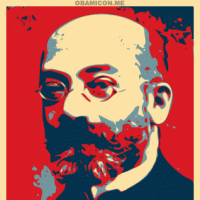Mesaĝoj: 22
Lingvo: English
Frakseno (Montri la profilon) 2009-februaro-12 17:07:11
It's also a nice little "intrusion" of Esperanto into my normal "non-Esperanto" activities when I get the email.
Frakseno (Montri la profilon) 2009-februaro-12 17:27:56
I've also been pleasantly surprised recently by some Esperanto pop music offerings. http://worldtv.com/esperanto_muziko_tv is a good way to get exposed to some artists, even if their playlist is a bit short, and I have been moved to purchase some music from Vinilkosmo to help Esperanto saturate my day away from the computer.
henma (Montri la profilon) 2009-februaro-12 18:28:06
jchthys:Angle:bryanhaydukewich:Curious, would this be grammatically correct: jchthys, dankon por skribis en Esperanton. Vi komprenas.Mi pensas, ke "Dankon por skribi en Esperanto" aŭ "Dankon por via skribado en Esperanto" estas ĝusta.
I think that "Dankon por skribi en Esperanto" or "Dankon por via skribado en Esperanto" is correct.
Really, he is giving thanks for something that already happened, so that is the CAUSE of the thanking.
It should be "dankon PRO", not "dankon POR".
I found that pro is not followed by infinitive, but you can always say:
Dankon pro tio, ke vi skribis en esperanto
or
Dankon pro via esperanta skribado.
Esperante:
Vere, li dankas pro io kio jam okazis, do tio estas la KIALO de tiu dankado.
Ĝi devus esti "dankon PRO", ne "dankon POR".
Mi malkovris tion, ke pro ne estas uzata antaŭ infinitivo, sed vi ĉiam povas diri:
Dankon pro tio, ke vi skribis en esperanto
aŭ
Dankon pro via esperanta skribado.
Amike,
Daniel.
Miland (Montri la profilon) 2009-februaro-12 19:00:23
Here's the comment from PMEG below the box:
"Danki por io estis malprave kritikata. Ĝi estas tute bona esprimo, ĉar la simileco al pagado estas klara. Sed oni povas ankaŭ uzi la esprimon danki pro io, kiu nuntempe estas tre ofta. Ambaŭ dirmanieroj estas same logikaj."
I translate: "Danki por io has been incorrectly criticised. It is a completely correct expression, since the similarity to payment is clear. But one can also use the expression danki pro io, which nowadays is more frequent. Both ways of speaking are equally logical."
jchthys (Montri la profilon) 2009-februaro-12 19:38:05
Senlando (Montri la profilon) 2009-februaro-12 23:40:48
ceigered (Montri la profilon) 2009-februaro-13 02:50:11
Senlando:Has anyone mentioned Facebook (or Vizaĝlibro) yet? It's not finished the translation process yet, but if you download the translation application, u can already use your facebook in Esperanto.Good point Senlando, most of facebook Esperanto has been translated, minus a few obscure things (like the new 'like/unlike' feature, which is a grammatical crack-up - I'm guessing 'sxati'/'nesxati' makes more sense in Esperanto).
(also, for some who don't use facebook, you're not literally downloading an application, it's just a little feature you add to your facebook)
Speaking of which, given the nature of Esperanto, I wonder how fast it is to pick up at an advanced level using an immersion method? Possibly several months?
jchthys (Montri la profilon) 2009-februaro-13 20:34:45
erinja (Montri la profilon) 2009-februaro-13 20:51:13
Haha in that case, I'd call it ŝati/eksŝati in Esperanto

Rogir (Montri la profilon) 2009-februaro-14 01:22:48
And I can tell you the translation of Facebook into Esperanto is bad. The biggest problem is inconsistency, and it occurs because the only way to view Facebook in Esperanto is to become part of the translator team, so many beginners start translating without any noteworthy communication between all them. My personal solution is to translate most of it myself, but one can only do so much by himself.







